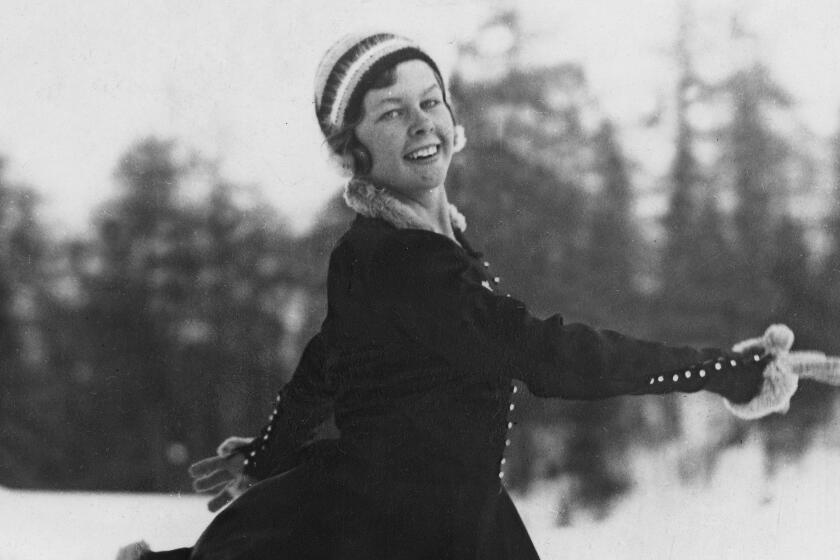Senate Panel Gets Steroid Probe Files
Amid increasing reports of steroid use in sports, a Senate committee is reviewing evidence from a criminal case in San Francisco, information that could help keep cheaters off the U.S. team that goes to the Olympic Games in Athens this summer.
The Commerce Committee subpoenaed the documents from the U.S. attorney’s office, which has charged four men with distributing performance-enhancing drugs to dozens of baseball and football players and Olympic athletes.
The legislative action could be a boost to a quasi-independent watchdog, the U.S. Anti-Doping Agency, which finds itself in a pinch three months before the Games.
With new allegations of steroid abuse in the news almost every day, the USADA is under pressure to act quickly but needs more ammunition, a source close to the situation said.
Federal agents have closely guarded their evidence. Although a government memorandum was leaked last weekend, alleging that top athletes such as Marion Jones and Tim Montgomery received steroids, the document did not give officials sufficient cause to take action, said the source, who spoke on condition of anonymity because of the continuing criminal case.
It remained unclear what information was included in the documents provided to the Senate.
“We’re viewing [the documents] and don’t have any comment on what is in them,” said Rebecca Hanks, a spokeswoman for Sen. John McCain (R-Ariz.), who chairs the committee.
The documents could include much useful evidence for the USADA, such as testimony from athletes called before a grand jury last fall.
Those testifying included such track and field stars as middle-distance runner Regina Jacobs, sprinters Kelli White and Chryste Gaines and shotputter Kevin Toth.
No athletes have been charged. Jones, Montgomery and San Francisco Giant slugger Barry Bonds, also listed in the memorandum, have denied taking steroids.
On Tuesday, an attorney for Jones welcomed the Senate’s involvement.
“This news is great; transparency is our friend in this matter. Nothing in her testimony provides a basis for [sports officials] to take action against her,” attorney Joseph Burton said. “In fact, her sworn testimony confirms what she has said all along -- that she is drug-free.”
If any witnesses admitted to taking steroids before the grand jury, the USADA could invoke a provision that allows it to seek punitive action without the usual positive urine sample.
Such actions can be initiated if the agency has “other reason” to believe a doping offense occurred. That could include evidence gathered by federal agents, such as canceled checks, shipping labels and e-mails.
A legal expert was troubled by the prospect of the Senate’s finding a way to provide such material to the USADA.
“There is precedent for Congress to subpoena grand jury material, but it is something that is rarely done,” said Jonathan Turley, a law professor at George Washington University.
Rules of evidence regarding such issues as hearsay do not apply to grand jury proceedings, and information submitted in this early phase of the process is often shown to be inaccurate or incomplete during trial, he said.
“If the purpose of this subpoena is to force athletes off the Olympic team, I would consider the purpose to be highly questionable,” Turley said.
In the meantime, the USADA has continued to seek help from the defendants in the San Francisco case, which centers on a small Northern California company called Bay Area Laboratory Co-Operative, or BALCO.
The four men charged are BALCO founder Victor Conte and Vice President James Valente, track coach Remi Korchemny and trainer Greg Anderson, who worked for Bonds.
USADA officials, who declined to comment, had another in a series of conversations with Conte’s lawyers last week.
Conte did not participate, and the talks went nowhere, said attorney Troy Ellerman, who reiterated that Conte would not cooperate unless USADA could help cut a deal with prosecutors.
“They want something but they’re not on the same page as the government,” Ellerman said. “I don’t think the U.S. government cares whether the Olympics are dirty. That’s just not their priority.”
Ellerman and another attorney, Robert Holley, have questioned the validity of the government memorandum, which was first disclosed by the San Jose Mercury News and San Francisco Chronicle. It summarizes a conversation between Conte and agents during a raid of BALCO’s office in September.
Ellerman and Holley concede the documents list athletes but have insisted their client was coerced into talking and that his remarks were misinterpreted.
Ellerman wondered why the interview wasn’t recorded. “You bring 25 guys with flak jackets and a helicopter and you can’t bring a tape recorder?” he asked.
No matter how powerful the suggestion of cheating in the memorandum, Turley and others said it could be vulnerable to argument.
If the USADA fails to obtain additional evidence, the U.S. Olympic movement faces a potentially embarrassing situation: Athletes could win in Athens only to have evidence of drug use introduced in court soon after.
“We would encourage anyone who has information that would be important for USADA to share that information as soon as possible,” U.S. Olympic Committee spokesman Darryl Seibel said.
More to Read
Go beyond the scoreboard
Get the latest on L.A.'s teams in the daily Sports Report newsletter.
You may occasionally receive promotional content from the Los Angeles Times.








